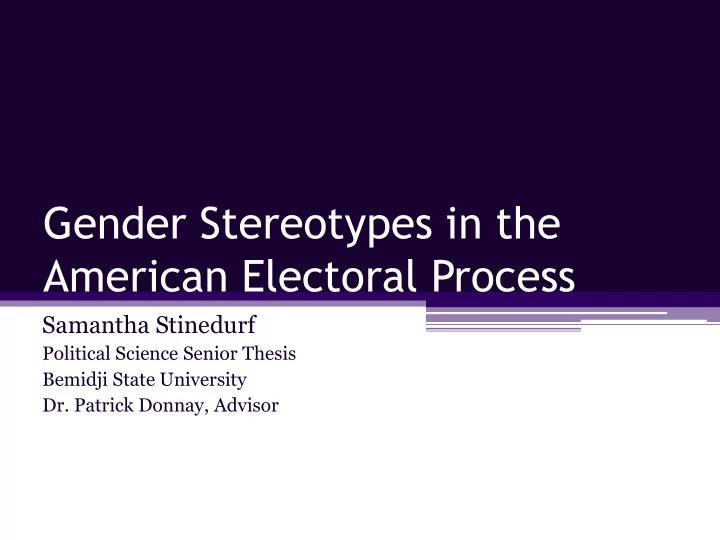

Gender Stereotypes in the American Electoral Process Samantha Stinedurf Political Science Senior Thesis Bemidji State University Dr. Patrick Donnay, Advisor
Introduction • Hypothesis: Gender stereotypes negatively affect public opinion of female candidates which decreases female politicians chances of running for, or being elected to, office. • Why am I interested in this topic choice? • Why are gender stereotypes important to consider in times of elections?
Literature Review • Ideological Orientations ▫ Individuals vote based on hard and soft characteristics. • Gender-Trait Stereotype • Gender-Belief Stereotype ▫ Leonie Huddy and Nayda Terkildsen: Gender Stereotypes and the Perception of Male and Female Candidates. American Journal of Political Science. • Interpretive Effect • Resource Effect ▫ Eileen McDonagh: It Takes a State: A Policy Feedback Model of Women's Political Representation. Perspective on Politics
Literature Review (continued) • Media ▫ What you watch can affect your perception of a female candidate. Who said the quote, “I can see Russia from my house?” ▫ Where you get your news from can be biased. ▫ Amount of coverage on a female candidate. Study conducted in 1982-86 of 26 Senate races. A male and female candidate were given two separate codes if they were mentioned in a paragraph in a major newspaper or magazine article. Concluded that male candidates were spoken of more often and female candidates were judged more on their viability rather then their stance on social and economic issues. ▫ Kahn, K. F. (1992). Does Being Male Help? An Investigation of the Effects of Candidate Gender and Campaign Coverage on Evaluations of U.S. Senate Candidates. The Journal of Politics .
Examples • Recent race in Massachusetts Scott Brown vs. Martha Coakley. ▫ Shannon O’Brien (state treasurer), “When you close your eyes and think of a governor or a president, immediately a picture comes to mind- for many people that is not a woman.” ▫ Katie Zezima: After Senate Race, “Some Say Barrier for Women in Massachusetts Still Stands.” Retrieved February 24, 2010, from The New York Times . • Women gaining recognition within their party ▫ John Bailey, “The only time to run a woman is when things look so bad that your only chance is to do something dramatic.”
Data & Methodology • ANES 2008 data set. • Feeling Thermometer of Democratic House Candidates (Table 1). • Created two variables to ▫ Among Democratic male and distinct between male and female respondents. female house races among • Feeling Thermometer of Democrats and Republicans. Republican House Candidates (Table 2). • Difference of means analysis. ▫ Among Republican male and female respondents. • Feeling Thermometer by • Used the variable feeling Political Party (Table 3). thermometer towards House Democrats and Republicans. ▫ All respondents.
Conclusion • My initial belief was that women candidates would be affected by the gender stereotypes. Although the results show a slight significance with my hypothesis, it is not fully supported. • Why? • Further Research: ▫ Use different variables to intercede with the variables already being used.
Questions?
Recommend
More recommend